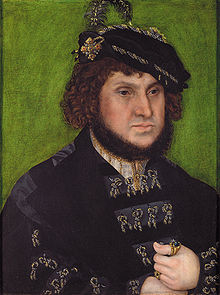Johann, Elector of Saxony
| Johann | |
|---|---|

Johann of Saxony by Lucas Cranach the Elder, 1509.
|
|
| Elector of Saxony | |
| Reign | 5 May 1525 – 16 August 1532 |
| Predecessor | Frederick III |
| Successor | Johann Frederick I |
| Born |
30 June 1468 Meissen, Electorate of Saxony, Holy Roman Empire |
| Died | 16 August 1532 (aged 64) Schweinitz, Electorate of Saxony, Holy Roman Empire |
| Burial | Schlosskirche, Wittenberg |
| Spouse |
Sophie of Mecklenburg-Schwerin Margaret of Anhalt-Köthen |
| Issue |
Johann Frederick I, Elector of Saxony Maria, Duchess of Pomerania John Ernest, Duke of Saxe-Coburg, Margaret Buser, Freifrau of Liestal |
| House | House of Wettin |
| Father | Ernest, Elector of Saxony |
| Mother | Elisabeth of Bavaria |
| Religion | Lutheranism |
Johann (30 June 1468 – 16 August 1532), known as Johann the Steadfast or Johann the Constant, was Elector of Saxony from 1525 until 1532. He was a member of the House of Wettin.
Born in Meissen, He was the fifth of the seven children of Ernest, Elector of Saxony and Elisabeth of Bavaria.
From 1486 onwards he was the heir presumptive of his childless brother Frederick the Wise; when he died in 1525, Johann inherited the title of Elector. As his nickname "The Steadfast" indicates, he resolutely continued the policies of his brother toward protecting the progress of the Protestant Reformation. In 1527 the Lutheran Church was established as the state church in Ernestine Saxony, with the Elector as Chief Bishop. He was a leader of the Schmalkaldic League of Protestant states formed in 1530 to protect the Reformation. As his nickname betrayed, he had the same positive attitude as his brother to the Reformation . His steadfastness and his courage to stand to his confession probably brought him the most fame with his contemporaries. Christian beliefs were also the basis of his political decisions, which were regarded as very just. In political matters, however, he often hesitated. In his collaboration with Landgrave Philip of Hesse , with whom he was closely connected by virtue of his common denomination, Philip was the driving force and spoke out more for an aggressive foreign policy. John, on the other hand, was particularly concerned with the question of whether to defend himself as a Protestant against the Emperor,
As the patron of Martin Luther, Johann maintained a very close, almost friendly relationship with the leading theologian of the Protestants. Luther also often expressed a positive opinion about John. Especially for his behavior at the Augsburg Diet in 1530, he praised him very much: "I am sure that the Elector Johann of Saxony had the Holy Spirit. In Augsburg he proved this admirably by his confession. John said, "Tell my scholars that they are doing what is right, praise and honor God, and take no regard for me or my country." By his insistence on the Protestant profession of faith, he is even to dismiss the Protestant theologians To behave too compliantly to the emperor.
...
Wikipedia
